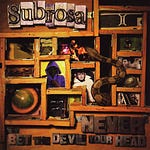The early 1990s were a transformative period in the music industry, with alternative rock and electronic music gaining significant traction. Industrial music, characterized by its abrasive sounds, experimental techniques, and dark themes, was evolving from its underground roots into a more prominent genre. Pioneered by bands like Throbbing Gristle, Cabaret Voltaire, and later Ministry and Skinny Puppy, industrial music was becoming a force to be reckoned with. Amidst this dynamic musical landscape, Nine Inch Nails released their second studio album, The Downward Spiral, on March 8, 1994. This record would not only define the band’s career but also become one of the decade's most enduring and influential albums.
For Trent Reznor, the mastermind behind Nine Inch Nails, the journey to The Downward Spiral was marked by significant evolution and turmoil. After the release of the debut album, Pretty Hate Machine, in 1989, Reznor found himself at odds with TVT Records, which had initially signed him. The label, expecting a band similar to Depeche Mode, was taken aback by Reznor's music's aggressive and industrial nature. This discord led to Reznor’s determination to break free from TVT’s constraints, eventually finding refuge with Interscope Records. This new alliance gave Reznor greater creative freedom and the resources to bring his ambitious vision to life.
The Downward Spiral represents a significant leap in Reznor’s songwriting and production techniques. Recorded in the infamous 10050 Cielo Drive mansion in Beverly Hills—the site of the Manson Family murders—Reznor transformed the house into a studio, which he aptly named Le Pig. This setting added a layer of macabre mystique to the album’s creation. Utilizing innovative production methods and embracing the emerging digital technology of the time, Reznor meticulously crafted a sound that blended heavy guitar riffs with electronic elements, pushing the boundaries of the industrial rock genre.
The album is a harrowing exploration of self-destruction, addiction, and existential despair. From the opening track, “Mr. Self Destruct,” to the haunting closer, “Hurt,” The Downward Spiral takes listeners on a dark journey through the protagonist’s psyche. The narrative delves into themes of self-loathing and inner conflict, with songs like “Piggy” and “Closer” capturing the visceral intensity of Reznor’s vision. “Closer,” often misinterpreted as a straightforward sex song, is a deeper exploration of obsession and self-degradation.
Tracks like “March of the Pigs” and “Reptile” showcase Reznor’s ability to fuse aggressive industrial beats with melodic hooks, creating a dynamic and unpredictable listening experience. “Hurt,” which would later be famously covered by Johnny Cash, serves as a poignant and emotional finale to the album, encapsulating the raw vulnerability at the heart of The Downward Spiral.
Reznor’s use of sampling further enhances the album’s innovative sound. Subtle samples from films like THX 1138 and The Texas Chainsaw Massacre are woven into the fabric of the music, adding an eerie and cinematic quality. The drumbeat in “Closer,” sampled from Iggy Pop’s “Nightclubbing,” is manipulated to create a unique and unforgettable rhythm.
Upon its release, The Downward Spiral received critical acclaim and commercial success, reaching number two on the Billboard 200. Its impact on the music industry was profound, cementing Nine Inch Nails’ place in the pantheon of alternative rock and industrial music. The album’s innovative approach influenced countless artists and helped shape the sound of the 90s.
Reznor’s meticulous production and thematic depth have ensured that The Downward Spiral remains a touchstone for fans and musicians alike. The album’s exploration of dark and complex themes continues to resonate, making it a timeless masterpiece.
As we celebrate the 30th anniversary of The Downward Spiral, it’s clear that Trent Reznor’s creation has lost none of its power or relevance. The album is a testament to Reznor’s artistic vision and ability to channel personal turmoil into groundbreaking music. For those who lived through its initial release and for new listeners discovering it today, The Downward Spiral offers a compelling and unforgettable journey into the depths of the human psyche.
Will you help us out?
In our quest to explore the depths of 90s Rock, we rely on you, our listeners. Your suggestions drive our show – be it an underrated classic or a forgotten gem. By joining our DMO Union on Patreon, you help us stay independent and ad-free and gain the power to vote on and choose the albums we dive into each year. Let's unearth the lost gems of 90s Rock, one listener-powered episode at a time.


















Nine Inch Nails - The Downward Spiral | 90s Rock Revisited